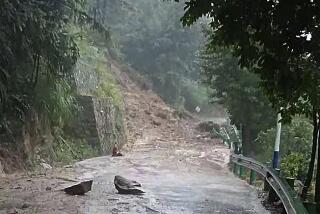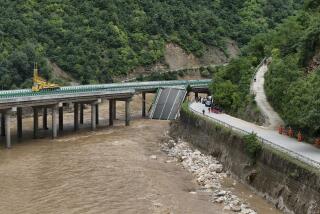Bombings leave 2 dead, 6 injured in Fuzhou, China
Synchronized explosions that Chinese authorities initially tried to cover up killed at least two people and injured six Thursday in the southeastern Chinese city of Fuzhou. The unusual attack was apparently set off by a disgruntled farmer outside local government offices.
Chinese nervousness over the blasts was apparent from a ham-handed attempt to keep the story out of the news. Angry local reporters in Fuzhou complained that police confiscated their notebooks and cellphones and deleted photographs from cameras. An early report posted on the official Xinhua news site that attributed the attacks to the farmer was later removed from the website.
Nevertheless, in an age when cellphone cameras and microblogs are challenging Chinese authorities’ penchant for concealment, photographs appeared almost immediately on Twitter and other sites showing a gray smoke cloud billowing over the government district, a blackened car that had concealed a bomb and the body of a victim lying under a hedge outside a government building.
The three blasts took place minutes apart — the first at 9:18 a.m., when a car bomb exploded in a parking lot at the prosecutors office, the second at 9:29 a.m. at the local government office for the Linchuan district of Fuzhou, and at 9:45 a.m., another car bomb, outside the Drug Inspection Bureau office, according to a statement from local police.
“The police are trying their best to solve this case,” the statement read.
A 4 p.m. news conference by local authorities to discuss the explosions was abruptly canceled and some journalists were told to stay the night at a nearby hotel.
The most serious of the explosions was outside the Linchuan district local office, the only blast not caused by a car bomb.
“I heard a loud bang. Our windows shook, although I didn’t realize right away that it was a bomb. We’ve never seen anything like this before,” said Sun Zhongkai, a printer whose shop is near the district government office. “What we’ve heard was that there was a local farmer who had a trial that the government didn’t handle very well and now he is retaliating.”
Police have not named a suspect. But whoever he is and whatever his motives, the bomber is quickly becoming something of a folk hero on the Internet.
“Well done my Brothers!” wrote one anonymous supporter, while another crowed, “Like the waves of the Yangtze River, one follows another. From China will emerge another Bin Laden.”
The case bears a resemblance to that of Yang Jia, a 28-year-old unemployed man who was applauded after killing six police officers in a Shanghai suburb in 2008 in apparent retaliation for a beating he allegedly received from the police while being apprehended the year before for riding an unlicensed bicycle.
China has tight regulations on firearms but experiences a large number of bombings engineered using homemade explosives. Often incidents are triggered by land confiscations for real estate developments or grievances that have gone unaddressed by China’s dysfunctional court system. Scholars also blame widening income disparities.
Sun Liping, a respected sociologist at Beijing’s Tsinghua University, reported this year that there were 180,000 incidents in 2010, double the number from 2006.
“Our society is going through a period of great change, so it is not unexpected that there is a rise in individuals who take these kinds of extreme measures,” another academic, Liu Shanying of the Chinese Academy of Social Sciences in Beijing, said Thursday.
However, Liu urged that people not speculate too much about the Fuzhou case until it is clear what happened.
Tommy Yang of the Times’ Beijing bureau contributed to this report.
More to Read
Sign up for Essential California
The most important California stories and recommendations in your inbox every morning.
You may occasionally receive promotional content from the Los Angeles Times.










